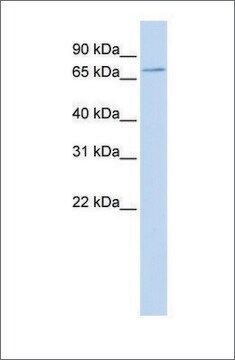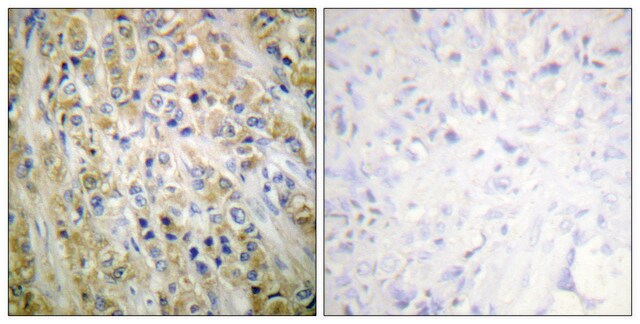ABC1454M
Anti-Sodium-Iodide Symporter Antibody, C-terminal 2
from rabbit
Sinónimos:
Sodium/iodide cotransporter, Na(+)/I(-) cotransporter, Na(+)/I(-) symporter
About This Item
Productos recomendados
biological source
rabbit
Quality Level
antibody form
affinity isolated antibody
antibody product type
primary antibodies
clone
polyclonal
species reactivity
human
technique(s)
flow cytometry: suitable
immunohistochemistry: suitable (paraffin)
immunoprecipitation (IP): suitable
western blot: suitable
isotype
IgG
NCBI accession no.
UniProt accession no.
target post-translational modification
unmodified
Gene Information
human ... SLC5A5(6528)
General description
Specificity
Immunogen
Application
Immunocytochemistry Analysis: A representative lot detected Sodium-Iodide Symporter in COS-7 cells transfected with wild-type human NIS and in COS-7 cells transfected with mutant Q267E human NIS (De la Vieja, A., et. al. (2005). Mol Endocrinol. 19(11):2847-58; De la Vieja, A., et. al. (2004). J Cell Sci. 117(Pt 5):677-87).
Immunohistochemistry Analysis: A representative lot detected Sodium-Iodide Symporter in Immunohistochemistry application (De la Vieja, A., et. al. (2004). J Cell Sci. 117(Pt 5):677-87; Wapnir, I.L., et. al. (2004). Clin Cancer Res. 10(13):4294-302; Wapnir, I.L., et. al. (2003). J Clin Endocrinol Metab. 88(4):1880-8).
Immunoprecipitation Analysis: A representative lot detected Sodium-Iodide Symporter in Biotinylated NIS constructs expressed in COS-7 cells (De la Vieja, A., et. al. (2004). J Cell Sci. 117(Pt 5):677-87).
Flow Cytometry Analysis: A representative lot detected Sodium-Iodide Symporter in COS-7 cells transfected with WT and mutant Q267E NIS (De la Vieja, A., et. al. (2004). J Cell Sci. 117(Pt 5):677-87).
Western Blotting Analysis: A 1:10,000 dilution from a representative lot detected Sodium-Iodide Symporter in COS-7 cells transfected with hNIS (Courtesy of Dr Nancy Carrasco & Dr. Andrea Reyna-Neyra at Yale University).
Western Blotting Analysis: A representative lot detected Sodium-Iodide Symporter in COS-7 cells transfected with NIS and COS-7 cells transfected with WT and mutant Q267E NIS (De la Vieja, A., et. al. (2005). Mol Endocrinol. 19(11):2847-58; De la Vieja, A., et. al. (2004). J Cell Sci. 117(Pt 5):677-87).
Immunohistochemistry Analysis: A representative lot detected Sodium-Iodide Symporter in IHC-P human salivary gland and breast tissues (Tazebay, U.H., et. al. (2000). Nat Med. 6(8):871-8).
Apoptosis & Cancer
Quality
Immunohistochemistry Analysis: A 1:50 dilution of this antibody detected Sodium-Iodide Symporter in human stomach tissue sections.
Target description
Physical form
Storage and Stability
Other Notes
Disclaimer
¿No encuentra el producto adecuado?
Pruebe nuestro Herramienta de selección de productos.
Storage Class
12 - Non Combustible Liquids
wgk_germany
WGK 1
flash_point_f
Not applicable
flash_point_c
Not applicable
Certificados de análisis (COA)
Busque Certificados de análisis (COA) introduciendo el número de lote del producto. Los números de lote se encuentran en la etiqueta del producto después de las palabras «Lot» o «Batch»
¿Ya tiene este producto?
Encuentre la documentación para los productos que ha comprado recientemente en la Biblioteca de documentos.
Nuestro equipo de científicos tiene experiencia en todas las áreas de investigación: Ciencias de la vida, Ciencia de los materiales, Síntesis química, Cromatografía, Analítica y muchas otras.
Póngase en contacto con el Servicio técnico








